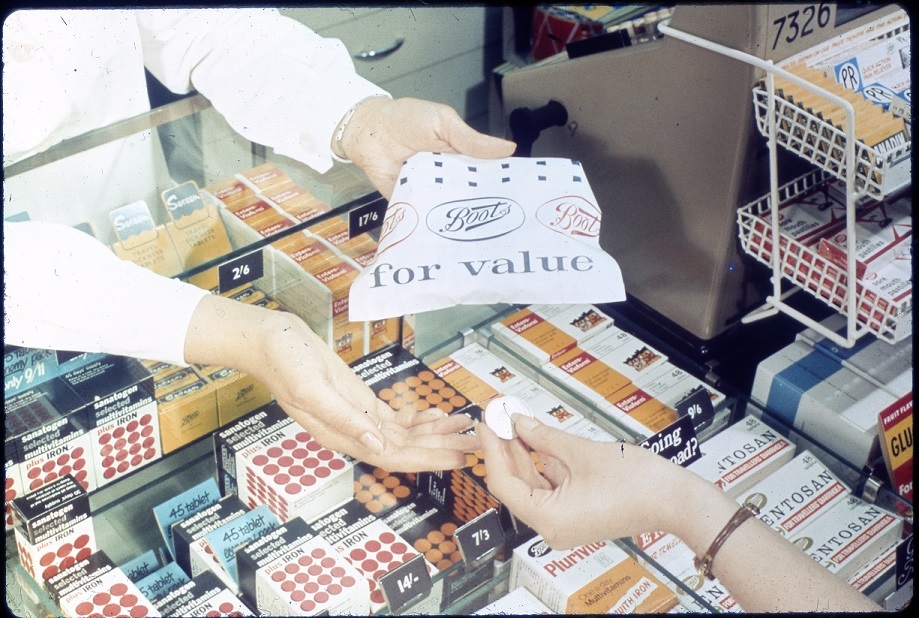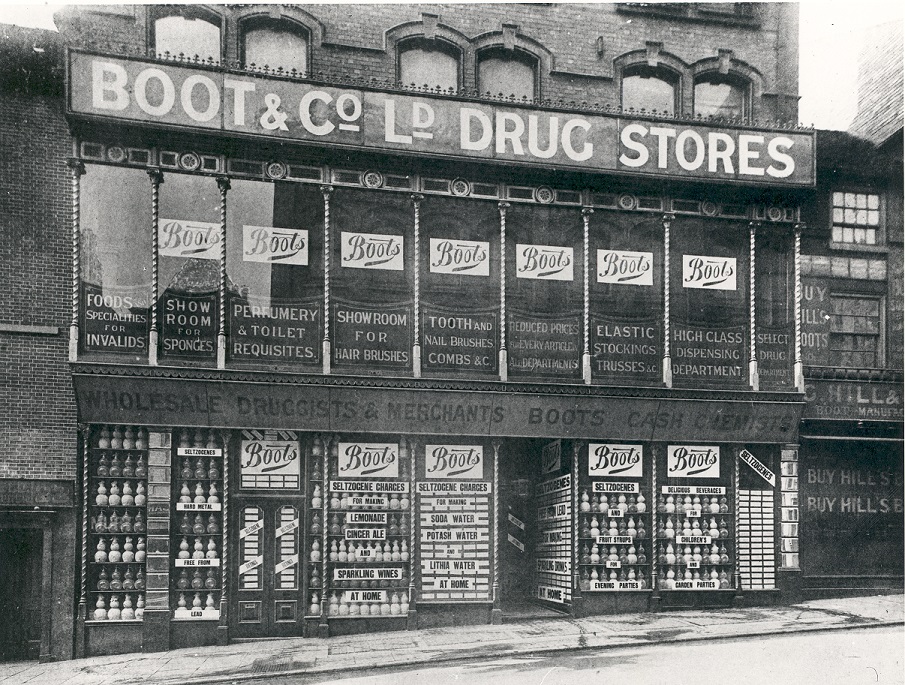'Health for a Shilling,' Cold Cream and Epsom Salts, No7 and home brew kits. The iconic products and adverts, from bygone days to the modern era, invoke memories for all of us of Boots.
To mark the 175th anniversary of the opening of the very first Boots – a name which is inherently linked to the social and economic history of Nottingham – a brand new exhibition, exploring how shopping has changed over nearly two centuries, will open at Lakeside Arts' Djanogly Gallery on 3 May and will run until 21 July 2024, and is free to visit.
Part design show, part social history, Counter Culture explores the transformation of Boots from the neighbourhood Victorian chemist to the superstores of the 1980s and beyond. It will also show the shifting dynamics of high-street healthcare and retail experiences.
Boots is now a household name, but it rose from humble beginnings. In 1849, John Boot opened a small herbalist store on Nottingham's Goose Gate, offering an affordable alternative to traditional medicines. John valued a 'healthcare for all' approach, and by the time his son Jesse took sole control of the business in 1877 he had positioned Boots as the store which offered traditional medicines at greatly reduced prices.
The exhibition explores how shopping has changed through the lens of the local Boots store, showing the evolution in response to changing customer needs, cultural aspirations and patterns of everyday life. It considers the technologies, display techniques, approaches to advertising and architectural designs that have shaped modern shopping.
For this exhibition we wanted to celebrate the history of Boots in a different way, by focussing on the Boots shopper. This is a celebration of ordinary experience and the factors that have shaped it over time."
Visitors can expect to see pharmaceutical and apothecary items such as 19th century carboys – decorative glass storage bottles which were commonly used by pharmacists to signal their trade to passers-by; and specie jars, containing rhubarb, cascara and Bengal quince, which like carboys, were used to adorn prestigious chemist shops.
Also on display is a 19th century pharmacist's workbench which shows how the pharmacist would work before mass production, making up individual medicines according to each customer's needs. Great care was taken to finish and package up the medicines, and labels stored in drawers were used to tell customers about the contents and dosage.

The exhibition also traces the evolution of advertisements, with highlights including a 1917 print from the famous artist Mabel Lucie Attwell. It was hugely popular and led to a keen marketing campaign for 'Regesan' a new own brand range from Boots. The characters were christened 'Reggie Sam' and 'Betty,' and Attwell produced several art prints showing the pair in different health-related scenarios. Also on display is the 'Mummy says….' advertisement from the 1940s which showed how children were often sent on errands to their local chemists to buy items. The message in this advert is about trust and suggests that Boots pharmacists would never mis-sell a product, even to a child.
We are so excited to examine the history of a company which is so close to the hearts of Nottingham residents and is such an integral part of the fabric of British shopping habits."
Visitors are invited to trace the historical shift from counter service to convenience, and discover the changing relationships between shopping and leisure, and the pharmacist's evolving role in providing healthcare to the community. In the final room of Counter Culture, the visitor is invited to join the conversation and share their own thoughts on the experience of shopping – past, present and future.

The exhibition, celebrating the 175th anniversary of Boots, cements a long and close relationship between the well-loved company and the University of Nottingham. Jesse Boot has long been regarded as not only a pioneer in business, but also for his philanthropic and welfare initiatives. In 1921, he gifted the land on which the University Park campus is built. Fittingly, the Djanogly Gallery stands on the site of Highfields Lido, which Jesse also donated to the people of Nottingham along with Highfields Park.
This is a wonderful way to celebrate our 175th anniversary within our local community. The exhibition places the Boots customer at the heart of our retail innovations and shows that our enduring position on the high street, is due to the ways in which we have responded to their changing needs."
A fascinating series of talks in connection to the exhibition will be running over the summer. In 1968, Boots launched a cosmetic range for teenage girls and their friends. The Story of Boots' 17 – a talk by PhD Candidate Jack Moss in the Department of History held on Thursday 9 May at 1pm – will explore how 17's marketing campaigns captured the era's emphasis on self-expression, whilst simultaneously persuading girls to restrain their make-up use.
Few people know that in the 1930s and 1940s, Boots opened branches in New Zealand and Fiji. Postdoctoral Research Assistant Hilary Ingram from the Department of History, will tell the curious story of these Boots stores down under, their dedicated staff members, customers, and popular products, in Dispensing Down Under, on Tuesday 4 June at 1pm.
Between the wars, multiple stores like Boots, Marks & Spencer and Woolworths became more integral in everyday life. A talk – The Coming of the Chains – by Richard Hornsey, Associate Professor of Modern British History, on Tuesday 16 July at 1pm, will explore how the chain store's scale and uniformity altered the shopping experience.
Details on all the bookable talks and gallery tours can be found here.
The exhibition Counter Culture: 175 years of shopping at Boots will run from Friday 3 May to Sunday 21 July at the Djanogly Gallery. Open Tuesday to Saturday from 10am to 4pm; Sunday 12 noon to 4pm; and closed Mondays. Admission is free.






